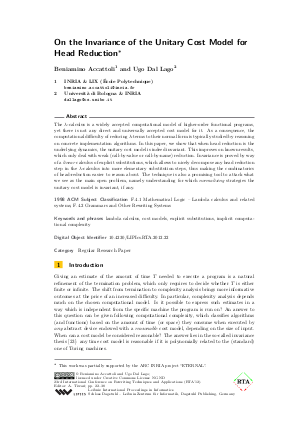On the Invariance of the Unitary Cost Model for Head Reduction
Authors Beniamino Accattoli, Ugo Dal Lago
-
Part of:
Volume:
23rd International Conference on Rewriting Techniques and Applications (RTA'12) (RTA 2012)
Part of: Series: Leibniz International Proceedings in Informatics (LIPIcs)
Part of: Conference: International Conference on Rewriting Techniques and Applications (RTA) - License:
 Creative Commons Attribution-NonCommercial-NoDerivs 3.0 Unported license
Creative Commons Attribution-NonCommercial-NoDerivs 3.0 Unported license
- Publication Date: 2012-05-29
File

PDF
LIPIcs.RTA.2012.22.pdf
- Filesize: 0.61 MB
- 17 pages
Document Identifiers
Subject Classification
Keywords
- lambda calculus
- cost models
- explicit substitutions
- implicit computational complexity
Metrics
- Access Statistics
-
Total Accesses (updated on a weekly basis)
0Document
0Metadata
Abstract
The lambda-calculus is a widely accepted computational model of higher-order functional programs, yet there is not any direct and universally accepted cost model for it. As a consequence, the computational difficulty of reducing lambda-terms to their normal form is typically studied by reasoning on concrete implementation algorithms. In this paper, we show that when head reduction is the underlying dynamics, the unitary cost model is indeed invariant. This improves on known results, which only deal with weak (call-by-value or call-by-name) reduction. Invariance is proved by way of a linear calculus of explicit substitutions, which allows to nicely decompose any head reduction step in the lambda-calculus into more elementary substitution steps, thus making the combinatorics of head-reduction easier to reason about. The technique is also a promising tool to attack what we see as the main open problem, namely understanding for which normalizing strategies the unitary cost model is invariant, if any.
Cite As Get BibTex
Beniamino Accattoli and Ugo Dal Lago. On the Invariance of the Unitary Cost Model for Head Reduction. In 23rd International Conference on Rewriting Techniques and Applications (RTA'12). Leibniz International Proceedings in Informatics (LIPIcs), Volume 15, pp. 22-37, Schloss Dagstuhl – Leibniz-Zentrum für Informatik (2012)
https://doi.org/10.4230/LIPIcs.RTA.2012.22
BibTex
@InProceedings{accattoli_et_al:LIPIcs.RTA.2012.22,
author = {Accattoli, Beniamino and Dal Lago, Ugo},
title = {{On the Invariance of the Unitary Cost Model for Head Reduction}},
booktitle = {23rd International Conference on Rewriting Techniques and Applications (RTA'12)},
pages = {22--37},
series = {Leibniz International Proceedings in Informatics (LIPIcs)},
ISBN = {978-3-939897-38-5},
ISSN = {1868-8969},
year = {2012},
volume = {15},
editor = {Tiwari, Ashish},
publisher = {Schloss Dagstuhl -- Leibniz-Zentrum f{\"u}r Informatik},
address = {Dagstuhl, Germany},
URL = {https://drops.dagstuhl.de/entities/document/10.4230/LIPIcs.RTA.2012.22},
URN = {urn:nbn:de:0030-drops-34820},
doi = {10.4230/LIPIcs.RTA.2012.22},
annote = {Keywords: lambda calculus, cost models, explicit substitutions, implicit computational complexity}
}
